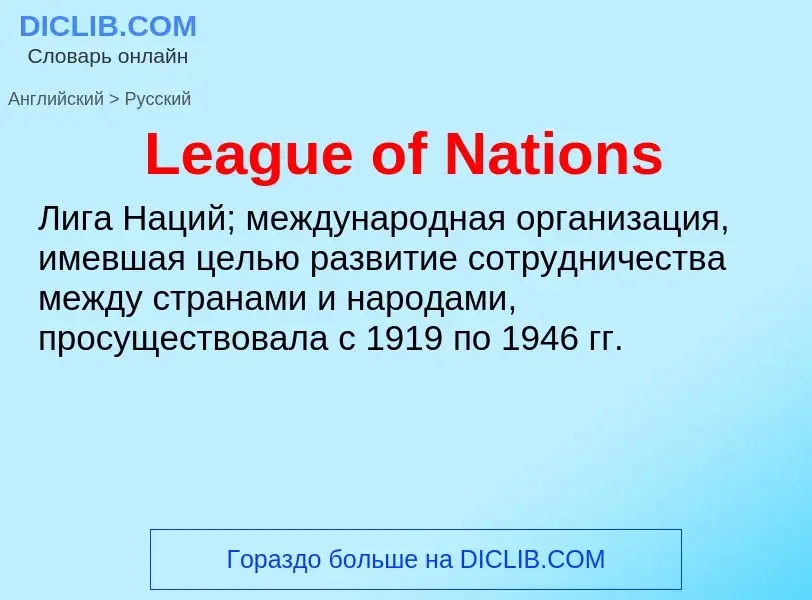Translation and analysis of words by ChatGPT artificial intelligence
On this page you can get a detailed analysis of a word or phrase, produced by the best artificial intelligence technology to date:
- how the word is used
- frequency of use
- it is used more often in oral or written speech
- word translation options
- usage examples (several phrases with translation)
- etymology
League of Nations - translation to russian
Definition
Wikipedia
The League of Nations (French: Société des Nations [sɔsjete de nɑsjɔ̃]) was the first worldwide intergovernmental organisation whose principal mission was to maintain world peace. It was founded on 10 January 1920 by the Paris Peace Conference that ended the First World War. The main organization ceased operations on 20 April 1946 but many of its components were relocated into the new United Nations.
The League's primary goals were stated in its Covenant. They included preventing wars through collective security and disarmament and settling international disputes through negotiation and arbitration. Its other concerns included labour conditions, just treatment of native inhabitants, human and drug trafficking, the arms trade, global health, prisoners of war, and protection of minorities in Europe. The Covenant of the League of Nations was signed on 28 June 1919 as Part I of the Treaty of Versailles, and it became effective with the rest of the Treaty on 10 January 1920. The first meeting of the Council of the League took place on 16 January 1920, and the first meeting of Assembly of the League took place on 15 November 1920. In 1919, U.S. president Woodrow Wilson won the Nobel Peace Prize for his role as the leading architect of the League.
The diplomatic philosophy behind the League represented a fundamental shift from the preceding hundred years. The League lacked its own armed force and depended on the victorious Allies of World War I (Britain, France, Italy and Japan were the permanent members of the Executive Council) to enforce its resolutions, keep to its economic sanctions, or provide an army when needed. The Great Powers were often reluctant to do so. Sanctions could hurt League members, so they were reluctant to comply with them. During the Second Italo-Ethiopian War, when the League accused Italian soldiers of targeting International Red Cross and Red Crescent Movement medical tents, Benito Mussolini responded that "the League is very well when sparrows shout, but no good at all when eagles fall out."
At its greatest extent from 28 September 1934 to 23 February 1935, it had 58 members. After some notable successes and some early failures in the 1920s, the League ultimately proved incapable of preventing aggression by the Axis powers in the 1930s. The credibility of the organization was weakened by the fact that the United States never joined, and Japan, Italy, Germany and Spain quit. The Soviet Union joined late and was expelled after invading Finland. The onset of the Second World War in 1939 showed that the League had failed its primary purpose; it was inactive until its abolition. The League lasted for 26 years; the United Nations (UN) replaced it in 1946 and inherited several agencies and organisations founded by the League.
Current scholarly consensus views that, even though the League failed to achieve its main goal of world peace, it did manage to build new roads towards expanding the rule of law across the globe; strengthened the concept of collective security, giving a voice to smaller nations; helped to raise awareness to problems like epidemics, slavery, child labour, colonial tyranny, refugee crises and general working conditions through its numerous commissions and committees; and paved the way for new forms of statehood, as the mandate system put the colonial powers under international observation. Professor David Kennedy portrays the League as a unique moment when international affairs were "institutionalised", as opposed to the pre–First World War methods of law and politics.

![World map showing [[member states of the League of Nations]] (in green and red) on 18 April 1946, when the League of Nations ceased to exist World map showing [[member states of the League of Nations]] (in green and red) on 18 April 1946, when the League of Nations ceased to exist](https://commons.wikimedia.org/wiki/Special:FilePath/18-IV-1946.png?width=200)



![In 1924, the headquarters of the League was named "[[Palais Wilson]]", after Woodrow Wilson, who was credited as the "Founder of the League of Nations." In 1924, the headquarters of the League was named "[[Palais Wilson]]", after Woodrow Wilson, who was credited as the "Founder of the League of Nations."](https://commons.wikimedia.org/wiki/Special:FilePath/Bundesarchiv Bild 102-00678, Genf.- Haus des Völkerbundrates.jpg?width=200)


![access-date=2023-02-24}}</ref> before moving into the ''Assembly Hall'' of the [[Palace of Nations]]. access-date=2023-02-24}}</ref> before moving into the ''Assembly Hall'' of the [[Palace of Nations]].](https://commons.wikimedia.org/wiki/Special:FilePath/League of Nations 1923.jpg?width=200)

![A sample [[Nansen passport]] A sample [[Nansen passport]]](https://commons.wikimedia.org/wiki/Special:FilePath/Nansenpassport.jpg?width=200)
![1864 Geneva Convention]], one of the earliest formulations of [[international law]] 1864 Geneva Convention]], one of the earliest formulations of [[international law]]](https://commons.wikimedia.org/wiki/Special:FilePath/Original Geneva Conventions.jpg?width=200)
![Emperor [[Haile Selassie I]] going into exile in Bath, England via Jerusalem Emperor [[Haile Selassie I]] going into exile in Bath, England via Jerusalem](https://commons.wikimedia.org/wiki/Special:FilePath/SelassieInJerusalem.jpg?width=200)
![Manchurian Crisis]] in 1932 Manchurian Crisis]] in 1932](https://commons.wikimedia.org/wiki/Special:FilePath/SesiónDeLaSociedadDeNacionesSobreManchuria1932.jpeg?width=200)
![Punch]]'' magazine, 10 December 1920, satirising the gap left by the US not joining the League Punch]]'' magazine, 10 December 1920, satirising the gap left by the US not joining the League](https://commons.wikimedia.org/wiki/Special:FilePath/The Gap in the Bridge.png?width=200)

![Cartoon showing Senators Lodge, Borah and [[Hiram Johnson]] blocking Peace Cartoon showing Senators Lodge, Borah and [[Hiram Johnson]] blocking Peace](https://commons.wikimedia.org/wiki/Special:FilePath/Refusing to give the lady a seat --Treaty of Versailles.jpg?width=200)
